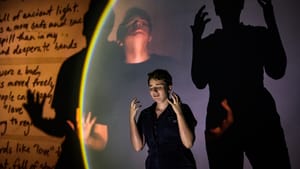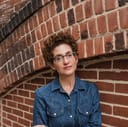Stay in the Loop
BSR publishes on a weekly schedule, with an email newsletter every Wednesday and Thursday morning. There’s no paywall, and subscribing is always free.
Holding space for dark matter
Philly Fringe 2024: Laurel Johnson presents Grief Astronomer

The title of Laurel Johnson’s autobiographical performance, Grief Astronomer, comes from poet and activist Andrea Gibson. “A difficult life is not less / worth living than a gentle one,” Gibson writes. “Joy is simply easier to carry / than sorrow.” According to the poem, the world needs grief astronomers to face darkness and interpret it for everyone else. In the Cannonball hub of this year’s Philly Fringe, Grief Astronomer does that and more in a moving yet whimsical performance journeying through childhood trauma, disability, and the cosmos.
A multidisciplinary performance artist, Johnson is originally from Philadelphia and now based in Chicago. They describe Grief Astronomer as “a world full of wonder that tells stories of resilience.” The performance is also daring, cohesive, entertaining, and modern.
“Trauma” has become a buzzword, but Grief Astronomer has an informed understanding of its definition and impact. Even better, Johnson finds and creates beauty and meaning in their narrative of living with disabilities and surviving abuse. Grief Astronomer isn’t for everyone, though—those who hate memoir/feelings or disregard trauma should stay away.
A metaphorical journey from the moon
Incorporating memoir, movement, theater, science, multimedia, props, and audience participation, Grief Astronomer reflects on memory, relationships, disability, and healing.
Johnson structures the show as a trip from the moon to the earth. They are the ship’s captain, and the audience comes along for the ride. Light projections evoke a dreamscape with multicolored stars. The color palette is the purple of memory rather than the black of space.
The trip begins with linking the Hubble Space Telescope to Johnson’s relationship with their parents, a physicist father and a suffocating mother. Johnson was born soon after the telescope’s launch, and the Hubble’s mirror flaw symbolizes their parents’ view of them as flawed. Young Laurel received the blame for their parents’ marital problems. By adolescence, Johnson was rejected by the father who ignited their passion for space and the mother who told her child that they shared a soul.
Grief Astronomer doesn’t hold back on sharing how such experiences make adult life confusing and challenging. By their 30s, Johnson survived multiple suicide attempts, escaped an abusive relationship, and received diagnoses of PTSD, long Covid, and neurological issues. They also cut ties with their family. This helped to correct their distorted perspectives, just as NASA corrected the Hubble’s mirror. The second half of the show moves from storytelling to interpretation as Johnson makes meaning of these experiences for themself and the audience.
As resilient as the Hubble
The show harnesses childlike curiosity and playfulness to balance the weight of its subject. Johnson leads the audience through a countdown and blastoff before traveling through the spaces of time, memory, and self. A mid-show interlude offers rapid-fire facts about space—did you know there are as many as two trillion galaxies? Deft handling of tone creates a safe space for what Gibson calls “truths that could / bring the light to its knees.” Johnson weaves in theoretical physics, family photos, Butoh-like movement, and snippets of Sesame Street and Mister Rogers’s Neighborhood. Somehow, it all works, cohering into an energetic and interesting show as engaging as it is technical.
Ultimately, the Hubble telescope exceeded expectations despite launching with a flaw. Grief Astronomer suggests that Johnson did, too, and so can others who live with trauma or disabilities. This is what resilience looks like. As for the future, let’s hope that it will look like Grief Astronomer. Johnson designed the radically accommodating show to include people with disabilities and sensory sensitivities. Meanwhile, our culture’s lack of a rhetoric of survivorship—well-known and understood language about surviving abuse—further marginalizes difficult yet common life experiences, and Grief Astronomer takes steps to correct that.
Know before you go: Grief Astronomer contains explicit descriptions of abuse, domestic violence, and suicide. Recommended for ages 13+.
What, When, Where
Grief Astronomer. By Laurel Johnson. $25. September 12-15, 2024, at Icebox Project Space, 1400 N American Street, Philadelphia. (215) 413-1318 or phillyfringe.org.
Accessibility
This show includes strobe/flashing lights.
Sign up for our newsletter
All of the week's new articles, all in one place. Sign up for the free weekly BSR newsletters, and don't miss a conversation.

 Melissa Strong
Melissa Strong